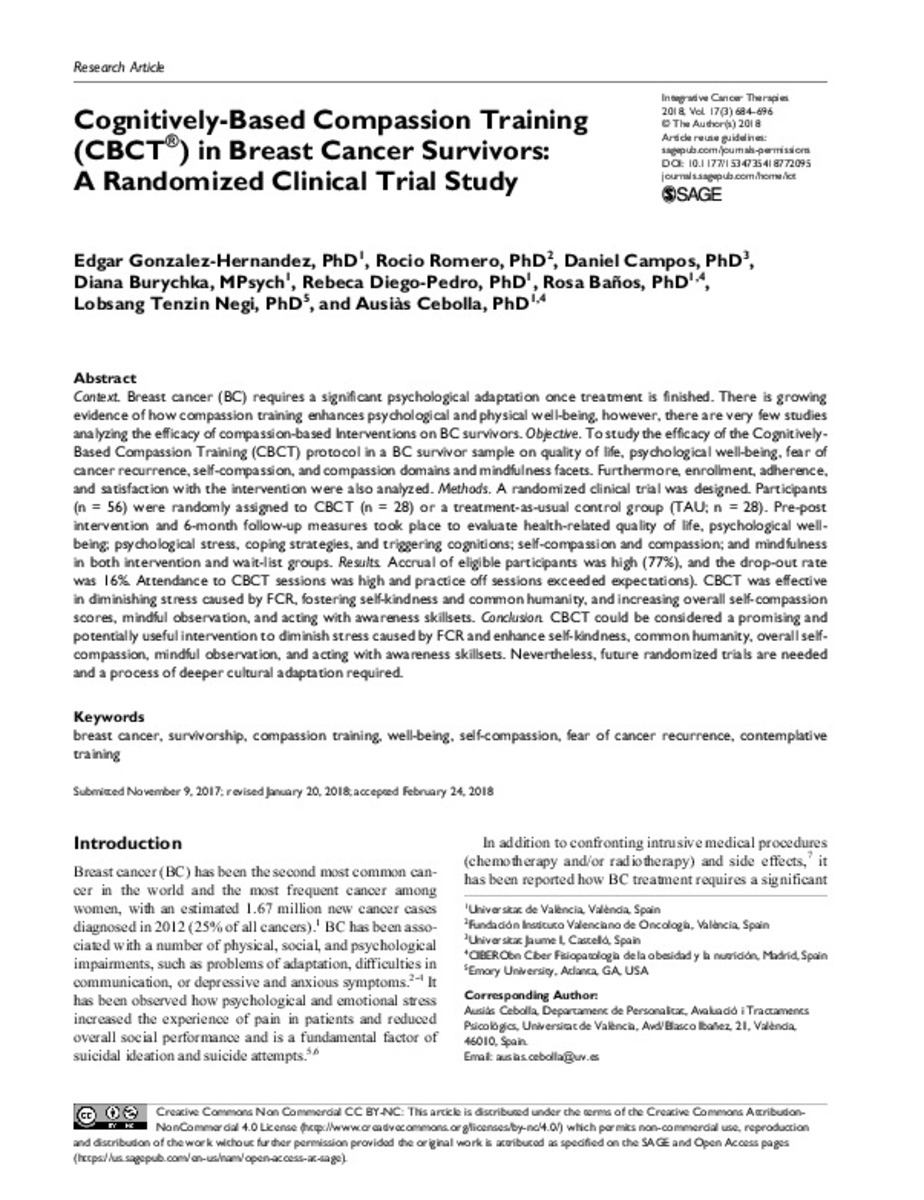Mostrar el registro sencillo del ítem
Cognitively-Based Compassion Training (CBCT (R)) in Breast Cancer Survivors: A Randomized Clinical Trial Study
| dc.contributor.author | González-Hernández, Edgar | |
| dc.contributor.author | Romero, Rocío | |
| dc.contributor.author | Campos, Daniel | |
| dc.contributor.author | Burychka, Diana | |
| dc.contributor.author | Diego-Pedro, Rebeca | |
| dc.contributor.author | Baños, Rosa Maria | |
| dc.contributor.author | Negi, Lobsang Tenzin | |
| dc.contributor.author | Cebolla Marti, Ausias | |
| dc.date.accessioned | 2018-11-13T08:42:26Z | |
| dc.date.available | 2018-11-13T08:42:26Z | |
| dc.date.issued | 2018-04 | |
| dc.identifier.citation | GONZALEZ-HERNANDEZ, Edgar, et al. Cognitively-Based Compassion Training (CBCT) in Breast Cancer Survivors: A Randomized Clinical Trial Study. Integrative cancer therapies, 2018, 1534735418772095. | ca_CA |
| dc.identifier.uri | http://hdl.handle.net/10234/177415 | |
| dc.description.abstract | Breast cancer (BC) requires a significant psychological adaptation once treatment is finished. There is growing evidence of how compassion training enhances psychological and physical well-being, however, there are very few studies analyzing the efficacy of compassion-based Interventions on BC survivors. Objective. To study the efficacy of the CognitivelyBased Compassion Training (CBCT) protocol in a BC survivor sample on quality of life, psychological well-being, fear of cancer recurrence, self-compassion, and compassion domains and mindfulness facets. Furthermore, enrollment, adherence, and satisfaction with the intervention were also analyzed. Methods. A randomized clinical trial was designed. Participants (n = 56) were randomly assigned to CBCT (n = 28) or a treatment-as-usual control group (TAU; n = 28). Pre-post intervention and 6-month follow-up measures took place to evaluate health-related quality of life, psychological wellbeing; psychological stress, coping strategies, and triggering cognitions; self-compassion and compassion; and mindfulness in both intervention and wait-list groups. Results. Accrual of eligible participants was high (77%), and the drop-out rate was 16%. Attendance to CBCT sessions was high and practice off sessions exceeded expectations). CBCT was effective in diminishing stress caused by FCR, fostering self-kindness and common humanity, and increasing overall self-compassion scores, mindful observation, and acting with awareness skillsets. Conclusion. CBCT could be considered a promising and potentially useful intervention to diminish stress caused by FCR and enhance self-kindness, common humanity, overall selfcompassion, mindful observation, and acting with awareness skillsets. Nevertheless, future randomized trials are needed and a process of deeper cultural adaptation required. | ca_CA |
| dc.format.extent | 13 p. | ca_CA |
| dc.format.mimetype | application/pdf | ca_CA |
| dc.language.iso | eng | ca_CA |
| dc.publisher | Sage | ca_CA |
| dc.rights | Copyright © 2018 by SAGE Publications | ca_CA |
| dc.rights | Atribución-NoComercial 4.0 Internacional | * |
| dc.rights.uri | http://creativecommons.org/licenses/by-nc/4.0/ | * |
| dc.subject | breast cancer | ca_CA |
| dc.subject | survivorship | ca_CA |
| dc.subject | compassion training | ca_CA |
| dc.subject | well-being | ca_CA |
| dc.subject | self-compassion | ca_CA |
| dc.subject | fear of cancer recurrence | ca_CA |
| dc.subject | contemplative training | ca_CA |
| dc.title | Cognitively-Based Compassion Training (CBCT (R)) in Breast Cancer Survivors: A Randomized Clinical Trial Study | ca_CA |
| dc.type | info:eu-repo/semantics/article | ca_CA |
| dc.identifier.doi | https://doi.org/10.1177/1534735418772095 | |
| dc.rights.accessRights | info:eu-repo/semantics/openAccess | ca_CA |
| dc.relation.publisherVersion | https://journals.sagepub.com/doi/abs/10.1177/1534735418772095 | ca_CA |
| dc.type.version | info:eu-repo/semantics/publishedVersion | ca_CA |
Ficheros en el ítem
Este ítem aparece en la(s) siguiente(s) colección(ones)
-
PSB_Articles [1303]
Articles de publicacions periòdiques








